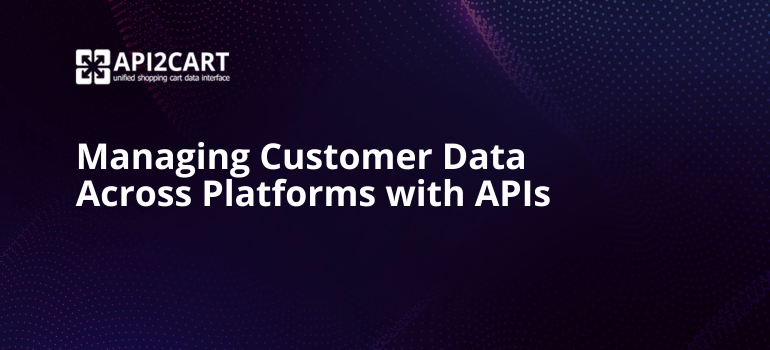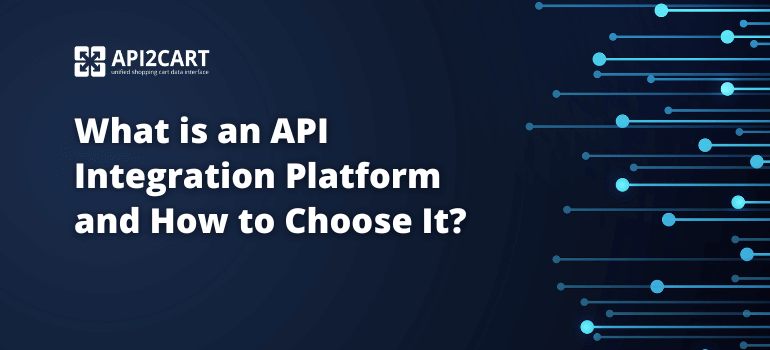
Managing and synchronizing customer data across systems is essential for personalized experiences, data consistency, and operational efficiency. For software developers, integrating customer data via APIs has therefore become critical. APIs act as connectors, enabling seamless data exchange between systems like CRM platforms, eCommerce stores, marketing tools, and customer support systems. As a result, they ensure secure, accurate, and real-time data flow across platforms.
In this article, we will explore the importance of customer data integration via API, key methods, and best practices for reliable and efficient integration across systems.
What is Customer Data Integration in eCommerce?
Customer data integration in eCommerce refers to the process of collecting, consolidating, and synchronizing customer-related data from multiple platforms, systems, and tools into a centralized, unified view. For software developers, customer data integration involves building and managing systems or APIs that enable seamless data exchange across eCommerce platforms, CRMs, marketing automation tools, ERP systems, and customer support platforms.
For software developers, customer data integration via APIs is not just about connecting systems, it’s about creating an ecosystem where customer data flows seamlessly, enabling businesses to deliver personalized customer experiences, optimize operational efficiency, and make data-driven decisions. By leveraging APIs, implementing robust validation rules, and adopting scalable architectures, software developers can build powerful customer data integration solutions that drive eCommerce success in an increasingly competitive landscape.

Why do eCommerce Software Need Online Store Customer Data?
In the world of eCommerce, customer data is one of the most valuable assets. For eCommerce software solutions, such as CRM systems, ERP platforms, marketing automation tools, and customer support software, access to accurate, real-time customer data is essential to deliver efficient operations, personalized experiences, and data-driven decisions. Here’s a detailed breakdown:
Personalized Shopping Experiences:
By analyzing customer data, such as purchase history and behavior, eCommerce platforms can provide personalized product recommendations, which increases the likelihood of sales. Tailoring discounts, offers, and promotions based on customer preferences improves engagement and conversion rates.Optimized Inventory Management:
Analyzing customer purchasing trends helps predict demand for specific products, reducing overstock and understock situations. Customer data can inform pricing strategies, such as discounts or promotions during high-demand periods.Fraud Prevention and Security:
Analyzing customer data helps identify unusual patterns that might indicate fraudulent activity. Ensuring customer data integrity enhances trust and provides a safer shopping environment.Legal and Compliance Considerations:
While collecting data, eCommerce software must adhere to data privacy laws (GDPR, CCPA) and ensure customer data is used ethically and securely.Improved Customer Support:
Purchase history, previous inquiries, and preferences help customer service representatives address issues more effectively. Leveraging data enhances automated support systems' ability to provide relevant and accurate responses.Enhanced Marketing Strategies:
Data allows businesses to segment their audience based on demographics, purchase patterns, and interests, enabling more effective targeted marketing campaigns. By understanding customer behavior, eCommerce platforms can retarget potential buyers who abandoned carts or showed interest in specific products.
In summary, customer data is the backbone of modern eCommerce operations. It empowers businesses to deliver better services, optimize operations, and maintain a competitive edge while building stronger relationships with their customers. However, it’s essential to handle this data responsibly and transparently to maintain customer trust.
Importance of APIS for Customer Data Integration across eCommerce Platforms
APIs (Application Programming Interfaces) are crucial for customer data integration in software development. They enable seamless connectivity between different systems, services, and platforms, allowing software developers to create scalable, efficient, and flexible solutions. Here’s why APIs are important for customer data integration:
Seamless Data Connectivity:
APIs enable the integration of customer data from various sources (e.g., CRMs, eCommerce platforms, social media, payment systems) into a centralized system. This provides a unified view of customer interactions, streamlining operations.Real-Time Data Synchronization:
APIs allow for real-time data exchange between systems, ensuring that customer data is always up-to-date across platforms. This is critical for software applications, systems and programs where timely information is key, such as live inventory updates or customer support interactions.Automation of Processes:
APIs facilitate automation by allowing different systems to interact without manual intervention. This reduces errors, saves time, and improves efficiency.Scalability and Flexibility:
APIs make it easier to scale software applications and systems as the business grows. Software developers can add new integrations, services, or modules without overhauling the existing infrastructure.Improved Data Accuracy:
By integrating APIs, businesses reduce the risk of errors from manual data entry or batch processing, ensuring accurate and consistent customer data across systems.Facilitates Third-Party Integrations:
APIs allow businesses to integrate with third-party services, adding functionality without needing to build everything from scratch.Simplified Development and Maintenance:
APIs abstract complex processes, making integration more straightforward for software developers. This reduces development time and simplifies maintenance by enabling modular design.Compliance and Security:
APIs can help enforce data security and compliance protocols, ensuring sensitive customer data is transferred and accessed securely.Enhanced Customer Experience:
Integrated customer data enables personalized user experiences, targeted marketing, and efficient service delivery. APIs allow software developers to fetch and use customer data dynamically for these purposes.
APIs are indispensable tools for software developers aiming to integrate and manage customer data effectively. They provide the connectivity, scalability, and efficiency needed to build systems that deliver rich, personalized customer experiences.
Moreover, APIs help maintain robust security and compliance. By leveraging APIs, software developers can ensure faster development cycles, streamlined processes, and a competitive edge in delivering data-driven solutions.

What Kind of Customer Data is it Possible to Get from eCommerce Platforms?
eCommerce platforms generate and store a wealth of customer data that can be invaluable for understanding consumer behavior, improving customer experiences, and optimizing business operations. Here’s an overview of the types of customer data that can typically be collected:
Personal Information - This includes basic details about the customer that are often collected during account registration or checkout:
- Name;
- Email address;
- Phone number;
- Shipping and billing addresses;
- Demographic data (e.g., age, gender, location).
Transactional Data - Data related to purchases and financial transactions on the platform:
- Order history (products purchased, quantity, and frequency);
- Payment method (e.g., credit card, PayPal);
- Transaction timestamps;
- Order value (total spend per order and lifetime value);
- Discounts or promo codes used;
- Refunds or cancellations.
Behavioral Data - This data captures how customers interact with the platform:
- Pages viewed (e.g., product pages, categories);
- Time spent on each page;
- Click-through rates (CTR);
- Browsing history;
- Products added to cart or wishlists;
- Cart abandonment events.
Engagement Data - Information about how customers interact with marketing and communication efforts:
- Email open rates and click-throughs;
- Newsletter subscriptions;
- Responses to surveys or feedback forms;
- Participation in promotions or loyalty programs;
- Social media interactions (likes, shares, comments, etc.).
By leveraging this diverse array of data, software developers and businesses can create data-driven strategies to improve customer engagement, optimize operations, and increase profitability.

How to Retrieve Customer Data via APIs from eCommerce Platforms?
Retrieving customer data via APIs from eCommerce platforms involves several steps, including understanding the API documentation, obtaining the necessary access credentials, and writing code to interact with the APIs. Below is a guide for software developers to achieve this:
Choose the eCommerce Platform:
Identify the eCommerce platform you are working with Shopify, WooCommerce, Magento, BigCommerce, and others. Each platform provides its own API with unique endpoints and authentication methods.Understand API Documentation:
Study the platform's API documentation to understand available endpoints (e.g., /customers, /orders), data formats (JSON, XML), authentication methods (API keys, OAuth 2.0), rate limits (number of requests allowed per minute/hour), required permissions for accessing specific data.Set Up API Access:
Generate API keys or tokens from the eCommerce platform's admin dashboard. Implement OAuth 2.0 flow if the platform uses it for secure access.Retrieve Customer Data:
Use the Relevant API Endpoints, сall the specific endpoints for customer data, ensuring you pass the correct parameters to filter or paginate results.Ensure Security and Compliance:
Encrypt sensitive data during storage and transfer. Follow privacy laws, such as GDPR or CCPA by anonymizing or limiting sensitive data. Use secure API communication (HTTPS).
In order to retrieve customer data, you need to integrate your eCommerce software with shopping platforms. Integrations are painful and they bring a lot of challenges with it. Setting up the infrastructure, hiring advanced developers, setting up integrations, and then maintaining them all takes a lot of time, money, and resources.
API2Cart is a unified API that allows you to integrate your eCommerce software with 60+ platforms and marketplaces, including Shopify, Magento, WooCommerce, BigCommerce, OpenCart, PrestaShop, and others. This simplifies customer data integration by eliminating the need for individual integrations.
With API2Cart, you won’t have to worry about costly setup, infrastructure, or maintenance. It offers 100+ methods to retrieve data from these platforms. Once integrated, your eCommerce software will seamlessly connect to all the eCommerce platforms where your customers have their e-stores.
For accessing customer data, API2Cart has the following API methods:
- customer.list – It allows the software to retrieve a list of customers from the client stores.
- customer.info – It allows the software to get customers’ information from the client store.
To know more about how API2Cart works, book a FREE demo with our manager.
Conclusion
In today’s fast-paced eCommerce world, customer data integration via APIs is essential. For software developers, APIs ensure seamless communication across multiple platforms, such as eCommerce systems, CRM tools, and marketing software. By acting as the connective tissue, APIs enable real-time data sharing, reducing silos and errors while ensuring reliable customer insights.
To sum up, API-based customer data integration empowers developers to create systems that enhance operational efficiency and customer satisfaction. As businesses rely more on data for growth, developers who master this integration will shape the future of digital commerce and customer engagement. Start your 14-day free trial and discover how API2Cart can simplify your integration process today.



